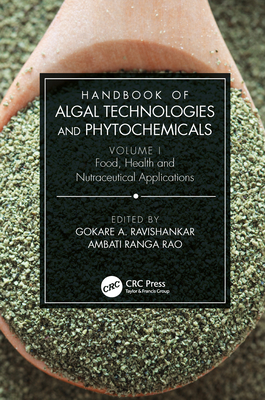Bioactive Compounds in the Storage Organs of Plants
Murthy, Hosakatte Niranjana, Paek, Kee Yoeup, Park, So-Young
- 出版商: Springer
- 出版日期: 2024-04-09
- 售價: $18,300
- 貴賓價: 9.5 折 $17,385
- 語言: 英文
- 頁數: 1084
- 裝訂: Hardcover - also called cloth, retail trade, or trade
- ISBN: 303144745X
- ISBN-13: 9783031447457
-
相關分類:
GAN 生成對抗網絡
海外代購書籍(需單獨結帳)
商品描述
This book offers a comprehensive and authoritative review of bioactive substances found in plant underground stems, roots, rhizomes, corms, and tubers from all around the world. Tubers and starchy roots are plants that store edible starch content in underground stems, roots, rhizomes, corms, and tubers. They are a key source for both human and animal consumption and are rich in carbohydrates. They are widely used as industrial crops as well. Phytochemicals found in tubers and roots, such as phenolics, terpenoids, and alkaloids, have anti-inflammatory, anti-cancer, hypoglycemic, hypocholesterolemic, and antibacterial properties. Except for common potatoes, sweet potatoes, and cassava, the nutritional and health benefits of many tuberous crops have not yet been adequately investigated. This book sheds new insights into these topics by addressing several plant metabolites found in storage organs, which can be seen as scientifically neglected even though they have a high economic relevance as food and pharmaceutical sources.
Divided into 6 parts, this book discusses how bioactive chemicals found in plant storage organs are synthesized and how their bioactive principles are specifically expressed in underground stems, roots, rhizomes, corms, and tubers. Additionally, each chapter includes background information on the plant, its parts, its nutritional makeup, chemical components, and biological functions. Given its breadth, the book appeals to a wide readership, from scholars through graduate and post-graduate students to professionals in the industry.
商品描述(中文翻譯)
本書全面且權威地回顧了來自世界各地植物地下莖、根、根莖、塊莖和塊根中的生物活性物質。塊莖和澱粉根是將可食用澱粉儲存於地下莖、根、根莖、塊莖和塊根中的植物。它們是人類和動物食用的重要來源,富含碳水化合物。它們也被廣泛用作工業作物。塊莖和根中的植物化學物質,如酚類、萜類和生物鹼,具有抗炎、抗癌、降血糖、降膽固醇和抗菌特性。除了常見的馬鈴薯、甘薯和木薯外,許多塊莖作物的營養和健康益處尚未得到充分研究。本書通過探討儲存器官中的幾種植物代謝物,為這些主題提供了新的見解,儘管它們在食品和藥物來源方面具有很高的經濟重要性,但在科學上卻被忽視了。
本書分為6個部分,討論了植物儲存器官中的生物活性化學物質如何合成以及它們的生物活性原理如何在地下莖、根、根莖、塊莖和塊根中表現。此外,每章還包括有關植物、其部分、其營養成分、化學成分和生物功能的背景信息。由於其廣度,本書適合廣泛的讀者,從學者到研究生和博士生,以及業界專業人士。
作者簡介
Hosakatte Niranjana Murthy is a Professor in the Post-Graduate Department of Botany, Karnatak University, Dharwad, India. Since, 1986, Prof. Murthy has served in various positions in the Post-Graduate Department of Botany, Karnatak University, Dharwad, India. Apart from teaching experience in the area of plant biotechnology, Prof. Murthy has post-doctoral and collaborative research experience in many foreign research institutes. He worked at Biotechnology Division, Tata Energy Research Institute, New Delhi, India (1992); Crop Science Department, University of Guelph, Guelph, Canada (1993); Research Centre for the Development of Horticultural Technology, Chungbuk National University, Cheongju, South Korea (2000-2001; 2002, 2004, 2006-2007, 2013-2014); and Department of Biological Sciences, University of Nottingham, Nottingham, United Kingdom (2005-2006) as a post-doctoral fellow/visiting scientist. Prof. Murthy is the recipient of various prestigious fellowships including Biotechnology National Associate and Biotechnology overseas Associate (awarded by Department of Biotechnology, Ministry of Science and Technology, Government of India), Brian Pool Fellowship (awarded by Korean Society of Science and Technology, South Korea), visiting fellowship (awarded by Korean Science and Engineering Foundation, South Korea), Commonwealth Post-doctoral Fellowship (awarded by Korean Association of Commonwealth Universities, UK). He has completed 15+ research projects funded by various agencies and supervised 20 Ph. D. students. Prof. Murthy has published 225 research articles in international peer-reviewed journals with high impact factors. Prof. Murthy has developed biotechnological methods for the production of pharmaceutically important secondary metabolites from cell and organ cultures of ginseng, Siberian ginseng, Echinacea, and St. John's wort using large-scale bioreactors along with South Korean collaborators. His experimental investigations on the use of adventitious root cultures in bioreactor technologies for the production of biomass and secondary metabolites have paved the way for the commercialization of plant-based pharmaceuticals and nutraceuticals.
Kee Yoeup Paek received his Ph.D. degree in 1984 from the Kyungbuk National University, South Korea, and he worked at Chungbuk National University, South Korea, for 40 years as an assistant professor, associate professor, and professor. He has received large funds from various agencies and established the Research Center for the Development of Advanced Horticultural Technology at Chungbuk National University, South Korea, and he was the director of this center till his superannuation. On the research front, he has worked on large-scale production of secondary metabolites from medicinal plant tissue culture and bioreactor culture technology; mass propagation of horticultural plants through bioreactor technology; morphological, physiological, and biochemical responses of in vitro produced plants during acclimatization; and flowering physiology of ornamental plants. Professor Paek was the president of the Korean Orchid Society, Korean Society for Horticultural Sciences, and Korean Plant Biotechnology Society. He has worked at the Institute of Plant Physiology, Russia; Department of Horticulture, Chiba University, Japan; University of Calgary, Canada; and University of California, Riverside, USA. He has published 630 papers, guided 47 Ph.D. students, 38 postdoctoral students, and active member of numerous research projects. He has 10 international patents awarded by Korea, Japan, and the USA. Professor Paek has developed biotechnological methods for the production of pharmaceutically important secondary metabolites from cell and organ cultures of ginseng, Siberian ginseng, Echinacea, and St. John's wort using large scale bioreactors. His experimental investigations on the use of adventitious root cultures and bioreactor technologies for the production of biomass and secondary metabolites have paved the way for the commercialization of plant secondary metabolites. Various ginseng-based commercial products have been released and are currently available in the market.
So Young Park is a Professor at the Department of Horticultural Science, Chungbuk National University, Cheongju, Republic of Korea. She graduated from Pusan University, Korea and received her Post-graduation and Ph. D. from Chungbuk National University, Korea. She was appointed as research scientist at Korea Forest Research Institute where she worked from 2002-2012. Subsequently, she was appointed as Assistant Professor at Chunbguk National University, Cheongju, Korea and served there as Associate Professor and working as Professor from 2021. She is working in plant biotechnology, especially, the regulation of secondary metabolite pathways in higher plants, regulation of stem cell differentiation and its mechanism and production of bioactive compounds in bioreactors. She has published 125 papers in national and international journals. She is on the editorial board of Plant Cell Tissue and Organ Culture, Plant Biotechnology Reports, Horticulture, Environment, and Biotechnology and Journal of Plant Biotechnology.
作者簡介(中文翻譯)
Hosakatte Niranjana Murthy是印度Dharwad的Karnatak大學植物學研究生部門的教授。自1986年以來,Murthy教授在Karnatak大學植物學研究生部門擔任多個職位。除了在植物生物技術領域的教學經驗外,Murthy教授還在許多外國研究機構進行了博士後和合作研究。他曾在印度新德里的塔塔能源研究所生物技術部門(1992年)、加拿大Guelph大學作物科學系(1993年)、南韓忠北國立大學園藝技術發展研究中心(2000-2001年;2002年、2004年、2006-2007年、2013-2014年)和英國諾丁漢大學生物科學系(2005-2006年)擔任博士後研究員/訪問科學家。Murthy教授獲得了多個著名獎學金,包括印度科學與技術部生物技術國家聯合會和海外聯合會(由印度科學與技術部頒發)、韓國科學與技術協會的Brian Pool獎學金(韓國)、韓國科學與工程基金會的訪問獎學金(韓國)和英聯邦協會的博士後獎學金(英國)。他完成了15個以上由各種機構資助的研究項目,並指導了20名博士生。Murthy教授在國際同行評審期刊上發表了225篇具有高影響因子的研究文章。Murthy教授與韓國合作夥伴一起,開發了從人蔘、西伯利亞人蔘、紫錐花和聖約翰草的細胞和器官培養中利用大型生物反應器生產藥用重要次生代謝物的生物技術方法。他對利用生物反應器技術生產生物量和次生代謝物的不定根培養的實驗研究為植物基藥和營養補充劑的商業化鋪平了道路。
Kee Yoeup Paek於1984年從韓國慶北國立大學獲得博士學位,並在韓國忠北國立大學擔任助理教授、副教授和教授職位長達40年。他從各種機構獲得了大量資金,並在韓國忠北國立大學建立了先進園藝技術發展研究中心,並擔任該中心的主任直到退休。在研究方面,他致力於從藥用植物組織培養和生物反應器培養技術中大規模生產次生代謝物;通過生物反應器技術大量繁殖園藝植物;研究體外培養植物在適應環境過程中的形態、生理和生化反應;以及觀賞植物的開花生理學。Paek教授曾擔任韓國蘭花學會、韓國園藝科學學會和韓國植物生物技術學會的主席。他曾在俄羅斯植物生理學研究所、日本千葉大學園藝學系、加拿大卡爾加里大學和美國加州大學河濱分校工作。他發表了630篇論文,指導了47名博士生和38名博士後研究生,並是許多研究項目的活躍成員。他在韓國、日本和美國獲得了10項國際專利。Paek教授與韓國合作夥伴一起,開發了從人蔘、西伯利亞人蔘、紫錐花和聖約翰草的細胞和器官培養中利用大型生物反應器生產藥用重要次生代謝物的生物技術方法。他對利用不定根培養和生物反應器技術生產生物量的實驗研究為植物基藥的商業化鋪平了道路。










